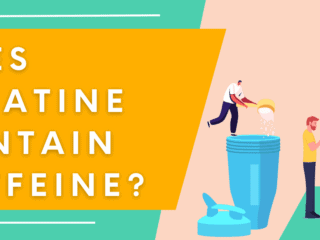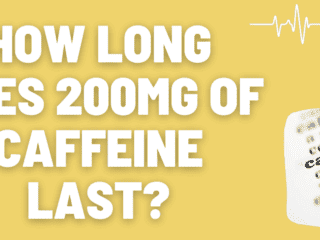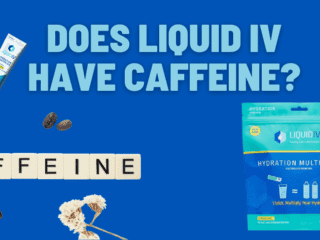Who doesn’t love the familiar scent and invigorating taste of coffee to start off a new day? But the aftereffects of the caffeine can be a real buster. So today, we’re spilling the beans on what’s the fastest way to get caffeine out of your system to help you enjoy your cup of joe better without worrying about the jitters.
- Fastest Way To Get Caffeine Out Of Your System
- The Pros & Cons Of Caffeine
- How Long Does Caffeine Last In The Body?
- How To Reduce The Effects Of Caffeine In The Body
- How Much Caffeine Is There In My Beverage?Â
- Popular Alternatives To Caffeinated Beverages
- Withdrawing From Caffeine
- Interactions
- Frequently Asked Questions
- Takeaway
Fastest Way To Get Caffeine Out Of Your System
The fastest way to get caffeine out of your system is to let time pass. Caffeine has a half-life of about 5-6 hours, meaning it takes about 5-6 hours for the body to eliminate half of the caffeine consumed.
So, if you have a cup of coffee with 100 milligrams of caffeine in it, after 5-6 hours, your body will have eliminated 50 milligrams of caffeine. To get rid of all of the caffeine in your system, you would need to wait for multiple half-lives to pass, which can take several hours or even a full day.
The Pros & Cons Of Caffeine
Drinking coffee isn’t a health sin per se. The familiar smell and flavor are almost irresistible for coffee lovers. Its benefits, like increased mental focus, boosted physical/mental energy, and even getting rid of a morning hangover, are reasons why many people make it their daily fix.
Caffeine is a natural chemical with stimulant effects. It is found in beverages like coffee, tea, cola, cocoa, guarana, or yerba mate. It stimulates the central nervous system, heart, muscles, and the centers that control blood pressure. The U.S. Food and Drug Administration (FDA) considers caffeine to be both a food additive and a drug.
Besides being an energy booster, people commonly use caffeine to relieve headaches and migraines and improve physical performance and memory. In a twist of its purpose, others also find that drinking a cup of coffee helps them fall asleep better.
When the body ingests caffeine, the enzymes in the liver break it down, metabolizing it into paraxanthine and theophylline, which temporarily block the A1 and A2 adenosine receptors in the brain. Adenosine, a chemical found in the cells, naturally builds in the system and promotes the sleep drive or a person’s need for sleep. But one won’t feel this sleepiness if it can’t bind to your receptors.
Unfortunately, some people end up being too dependent on coffee, which gradually evolves into an addiction, which then causes health problems. Having too much caffeine in your system can result in problems like dehydration, anxiety, and dizziness (Though it might also depend on your sensitivity to caffeine and how much you consume)
Things like energy spikes and crashes also come after drinking coffee and tend to affect one’s health and wear out the body. Frequently experiencing those side effects could signify that you are prone to various health issues. Various studies show that drinking too much coffee could result in blood pressure issues, increasing the risk of a stroke or a heart attack.
How Long Does Caffeine Last In The Body?
You can feel the effects of caffeine as soon as 15 minutes after you take it. The level of caffeine in your blood peaks about one hour later and stays at this level for several hours for most people. Half of the content remains in the system for about 6 hours after consumption and may even last up to 10 hours before the body is completely clear from the caffeine in the bloodstream.
How To Reduce The Effects Of Caffeine In The Body
While caffeine can last up to 10 hours in the body, you can follow these tips to help minimize the negative effects of caffeine on the body.
- Exercise regularly – Physical activities, even as simple as a light walk, can help neutralize anxiety and nervousness caused by drinking caffeine. In one new study, researchers compared the effects of caffeine and exercise on working memory and found that doing acute exercise could be as good for the mind as it is for the body.
- Practice deep breathing – Taking slow, deep breaths for 5 minutes can help relieve your anxiety after drinking coffee. Practicing meditation can also help calm your mind and nervous system.
- Eat the caffeine away – Foods with potassium or magnesium (like bananas) help replace the ones wiped out by caffeine, the lack of which can contribute to the tremors and jitters of caffeine overdose. Eating fiber-rich foods, such as whole grains, beans, potatoes, peas, turnips, nuts, and seeds, could also slow the release of caffeine into the bloodstream.
- Always stay hydrated – Increasing your water intake can help relieve symptoms while you wait for the caffeine to leave your system. Studies report that drinking water can help relieve caffeine-induced jitters, which could combat dehydration â a factor that worsens caffeine’s side effects.
- Consider taking decaf – Decaffeinated coffee is a good alternative if you still want to enjoy coffee’s flavor and health benefits, especially if you’ve become extremely sensitive to caffeine. However, it still contains very low amounts of caffeine, at 2-7 mg per cup.
- Watch your medications – Some medications, supplements, and personal care products may also have caffeine. Over-the-counter pain relievers like Aspirin and Alka Seltzers can pack up to 40-60 mg in a single dose.
- Check your workout supplements – Most workout supplement brands contain a large dose of caffeine as one of the main active ingredients, primarily responsible for any energy-boosting effects, with brands containing up to 250 mg in just 2 teaspoons (10 g).
- Wait it out – Ultimately, it’s difficult to instantly “flush” caffeine out of the body. Its stimulatory effects are usually noticeable within the first 45 minutes of intake and can last 3 – 6 hours. Moreover, caffeine can take up to 10 hours to completely clear your system. If you’re having sleeping problems, it’s best to stop consuming caffeine 6 – 8 hours before bedtime.
- Stop taking caffeine altogether – Stop caffeinating as soon as you notice adverse effects like shakiness, headaches, and faster heartbeats. Avoid foods and beverages with caffeine, such as coffee, tea, energy drinks, soda, dark chocolate, and some ice creams and desserts.
How Much Caffeine Is There In My Beverage?
The amount of caffeine in your food and drink varies. The caffeine content per cup of coffee and tea depends on the brand, the type of beans or leaves used, how it is prepared, and how long it steeps. Certain types of coffee can have as little as 2 mg of caffeine (decaffeinated coffee) per cup and have as high as 200 mg per cup (Arabica).
â How Long Does 200mg Of Caffeine Last?
â Caffeine Intake in America Study
â Does Creatine Contain Caffeine?
On the other hand, tea contains about 40 mg of caffeine but ranges from 9 to 110 mg a cup. Popular soft drinks/carbonated beverages usually have 30 to 60 mg of caffeine (per 12 oz), while an 8 oz serving of a leading energy drink brand has between 50 and 160 mg.
How much is too much?
A person’s caffeine tolerance varies based on age, genetics, weight, and the liver’s ability to process caffeine. The FDA has recommended a maximum of 400 mg daily (about 4 to 5 cups of coffee) for healthy adults, which won’t cause serious side effects.
Taking beyond the maximum limit may cause the following symptoms:
- Headaches
- Insomnia
- Jitters
- Anxiousness
- Fast heartbeats
- Stomach problems
- Nausea
Popular Alternatives To Caffeinated Beverages
Thankfully, alternatives with little to zero caffeine content are readily available for those who want to avoid caffeine.
- Apple cider vinegar – Apple cider vinegar is a caffeine-free alternative that can boost energy levels and has beneficial effects on blood sugar levels. It can also promote weight loss.
- Chicory root – Chicory root is a naturally caffeine-free herb that makes an excellent substitute for those who want to reduce their caffeine intake. Chicory contains manganese which has anti-oxidative properties that help improve blood flow to the brain and fight free radicals, and vitamin B6, essential for brain function.
- Mushroom coffee – This particular coffee alternative brings the classic aroma, flavor, and efficiency of a regular cup of coffee but with lesser caffeine content and without the usual coffee jitters and energy crashes. This drink is done by drying mushrooms, extracting their beneficial ingredients, and adding them to coffee.
- Tea – Tea variants like matcha, ginger, chai, peppermint, chamomile, and rooibos offer the same energy-boosting and brain-boosting benefits as coffee does, but with lesser amounts of caffeine.
Withdrawing From Caffeine
If you have developed a dependence on caffeine, a sudden cutback can cause withdrawal symptoms, which begin 12 to 24 hours after the last intake and may last from 2 to 9 days. These include:
- Headaches
- Fatigue
- Concentration problems
- Nausea/vomiting
- Muscle pain
- Irritability
- Chest pain
- Breathing problems
- Uncontrollable muscle movement
- Fever
- Irregular heartbeat
- Severe dehydration
If you’re used to drinking caffeine-based beverages regularly, and want to cut back, it’s best to do so gradually until you’ve completely steered clear from them. Gradually reducing caffeine consumption over 2 to 3 weeks will help you change your habit without causing withdrawal symptoms.
In general, the more caffeine you are used to consuming, the more severe the withdrawal symptoms manifest themselves. If you experience these symptoms after consuming too much caffeine, seek immediate medical attention.
Interactions
The following medications have been known to interact with coffee, so it’s best to take them apart.
- Ephedrine
- Antidiabetic drugs
- Theophylline
- Phenothiazines
- Anticoagulant drugs
- Tricyclic antidepressants
- Asthma medications
- Contraceptive drugs
Frequently Asked Questions
Can Caffeine Be Addictive?
People can quickly develop a dependence on coffee and other caffeinated beverages, which could be attributed to the chemical changes sustained consumption produces in the brain. Then, they will develop a tolerance just as they would to other drugs or alcohol.
If you take caffeine on a regular basis and your body has already become used to it, you can experience a few withdrawal symptoms when you stop. But unlike opioid or alcohol withdrawal, caffeine withdrawal is not considered dangerous, though it can be quite unbearable.
Is Caffeine Bad for Children?
Experts from Columbia University say that children consuming caffeine not only suffer interferences with the regular development of children (acquisition of skills, emotional and social health, and more), and it also causes side effects that may could long-term health consequences if a child also has underlying health conditions, like anxiety, chronic kidney disease, high blood pressure, or anxiety.Â
Ultimately, caffeine has no nutritional value for children.
Who Shouldn’t Drink Coffee?
People with the following conditions should avoid taking heavily caffeinated products.
– People with any sleep disorder like insomnia
– Those who have GERD or ulcers – (low acidity coffee for GERD)
– Pregnant women
– Breastfeeding women
– Those with frequent migraines or chronic headaches.
– People with high blood pressure.
– People were taking certain stimulants, antibiotics, asthma medicines, and heart medicines. (These medications could interact with caffeine).
– People who have anxiety and nervous disorders.
– Those who have a fast or irregular heartbeat.
Takeaway
Caffeine is a great, natural way to boost energy levels and greatly improve your physical and mental functions: While it’s beloved by many, some people experience unpleasant side effects due to caffeine sensitivity or if they’ve consumed too much and want to flush it from their system.
Common side effects of caffeine include headaches, jitters, and rapid heart rate. Reduce your intake if you experience any unwanted symptoms. While there is no known way yet to flush out caffeine from the body, habits like walking, eating vitamin-rich foods, and exercising can make a great difference.
If symptoms worsen or continue, consult your healthcare provider to help you discuss possible treatment methods and prescriptions.
Disclaimer: this article does not constitute or replace medical advice. If you have an emergency or a serious medical question, please contact a medical professional or call 911 immediately. To see our full medical disclaimer, visit our Terms of Use page.








